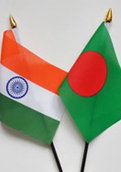Need For a Proactive Policy Towards Bangladesh
Given the assertive foreign policy followed by China and the desperation of Pakistan after the abolition of Article 370, India has to follow a proactive foreign policy. It is only India’s proactiveness that can keep both China and Pakistan in check in Bangladesh.
- Anand Kumar
- September 18, 2020











